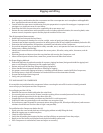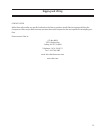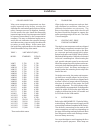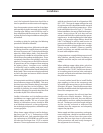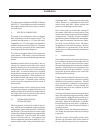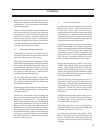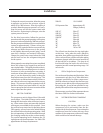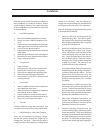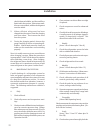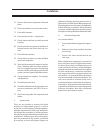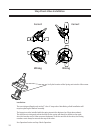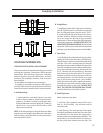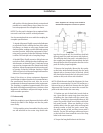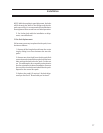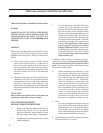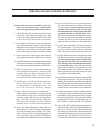
22
should show no bubbles, and there will be a
liquid seal in the receiver. If these two condi-
tions are not satised, additional refrigerant
must be added.
5. When sufficient refrigerant has been
charged into the system, close the charging
and drum valves. Then remove the drum
from the system.
6. During the charging period, observe the
gauge carefully to insure no operating dif-
culties. Watch head pressures closely to
make sure the condensers are functioning
properly.
Since it is usually necessary to use several drums
when charging a system, follow the procedures
in paragraphs E1 and E2 of the above description
when attaching a new drum. After charging,
the refrigerant drums should be kept nearby for
several days as it is sometimes necessary to add
more refrigerant as the system “settles down”.
IX. MAINTENANCE SUGGESTIONS
Careful checking of a refrigeration system for
leaks and proper operation of all components
upon installation will start the system on its way
to a long life of satisfactory service. To ensure
the desired trouble-free operation, however, a
systematic maintenance program is a prereq-
uisite. The following maintenance schedule is
suggested.
A. Daily
1. Check oil levels.
2. Check all pressure and temperature read-
ings.
3. Check micronic oil lter inlet and outlet pres-
sures for excessive pressure drop. Change
lter when pressure drop exceeds 45 psi or
every six months, whichever occurs rst. For
proper procedure for changing micronic oil
lter and for charging oil into the system, see
Operation Section.
4. Clean strainers each time lter cartridge
if replaced.
5. Check compressor sound for abnormal
noises.
6. Check shaft seals for excessive oil leakage.
A small amount of oil leakage (approxi-
mately 10 drops/min) is normal. This
allows lubrication of the seal faces.
B. Weekly
(Items 1 thru 6 above plus 7 thru 9)
7. Check the refrigeration system for leaks
with a suitable leak detector.
8. Check oil pressures and review micropro-
cessor log and log sheets.
9. Check refrigerant levels in vessels.
C. Monthly
(Items 1 thru 8 above plus 9 thru 13)
10. Oil all motors and bearings. Follow manu-
facturer’s instructions on lubrication.
11. Check calibration and operation of all
controls, particularly safety controls.
12. Check oil cooler for any evidence of cor-
rosion, scaling or other fouling.
13. Operate compressor capacity and volume
ratio controls through their range both
automatically and manually.
D. Trimonthly
(About 2000 operating hours)
Check movement of compressor rotor at drive
coupling end to determine bearing oat. (Re-
fer to Service Section.)
E. Yearly
(Items 1 thru 13 and “D” above plus 14
thru 28)
14. Check entire system thoroughly for leaks.
Installation



